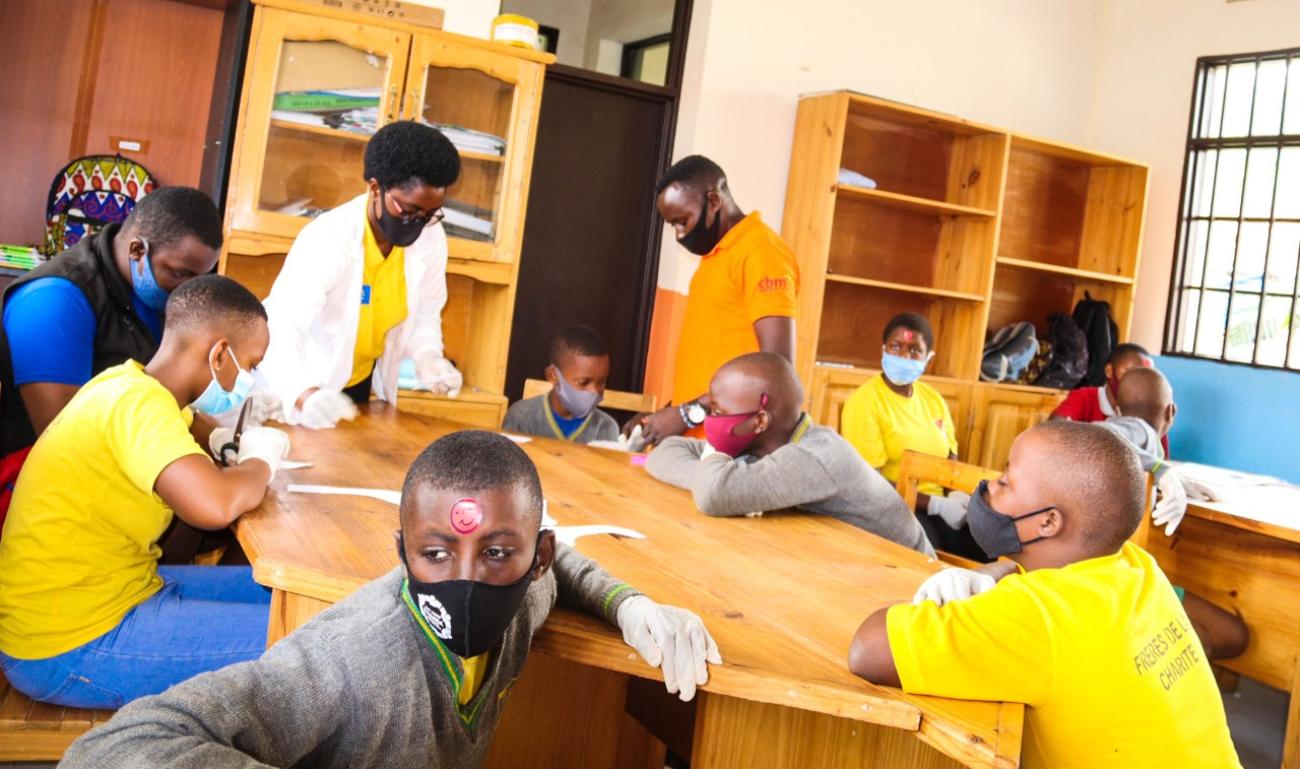UN Rwanda and partners launched a joint Disability Inclusion Initiative

The Disability Inclusion Initiative is aligned with the UN’s principle of “Living no one behind” streamlined in Agenda 2030.
On 30th November 2020, the One UN Rwanda, the UNDP, the National Council of Persons with Disabilities (NCP), and other partners, in partnership with HVP Gatagara launched a disability inclusion initiative to promote innovative learning for children with disabilities. The initiative aims at empowering persons with disabilities in Rwanda for them to achieve their full potential.
The launch of this initiative took place at HVP Gatagara which is the main rehabilitation Center in the Country. It is part of the celebration of the International Day of Persons with Disabilities celebrated every December. The initiative echoes this year’s theme “Building back better: toward a disability-inclusive, accessible and sustainable post-COVID-19 world.”
Introduction of smart boards and internet in HVP Gatagara schools
On the occasion, UNDP partnered with Liquid Telecom to provide 10 smart boards to HVP Gatagara schools as well as free internet as a way of scaling up the smart classroom* promoted by the Government of Rwanda.
The Director of HVP Gatagara, Frere Kizito Misago said that smart boards and internet connectivity are of great importance for both the children with disabilities and their teachers. “As technology advances, people with disabilities should not be excluded. We are appreciative of this support because the internet will help children and teachers to do research on various subjects and stay connected,” said Kizito adding that “When teachers use a chalk-board, children, especially those with mental health problems are distracted; the smart boards are the right tools do tackle this issue for students will be more attentive and curious to follow their teacher.”
Frere Kizito commended the continued support of UN agencies, especially UNDP to promote disability inclusion and ensure that rights of persons with disability are respected and protected.
Speaking at the occasion, Mr. Maxwell Gomera, the UNDP Resident Representative in Rwanda echoed Frere Kizito’s statement on how these innovative tools are going to positively impact on education of children with disabilities. “Being connected can make a difference in the lives of Rwandans living with disabilities in the way they access broadband, they access the education materials. So, I am pleased that together with Liquid Telecom, we are committing to provide access to the benefits of the internet to children at HVP Gatagara,"said Mr. Gomera.
With the support of the Rwanda Education Board, the smart boards will enable easier access to national curricula online modules hence ensuring equitable access to education for all particularly students with disabilities.
Children with disabilities require not only adapted learning tools but also ensuring that these children basic needs are duly catered for. Therefore, through the disability inclusion initiative, UNFPA Rwanda handed over 3000 sanitary pads to HVP Gatagara to ensure adequate menstrual hygiene and improved access to sanitation for young girls with disabilities.
Overall, the disability inclusion initiative calls on different stakeholders mainly the public sector, the private sector, civil society organizations, development partners and the UN in Rwanda to contribute towards decent living conditions for persons with disabilities. It is also calling for innovative partnerships bringing together the comparative advantage of each actor to find sustainable solutions for the empowerment of persons with disabilities.
The UN Resident Coordinator Dr. Fode Ndiaye commended the Government of Rwanda and National Council for People with Disabilities for remarkable efforts in promoting inclusion. He reiterated UN’s support to ensure that disability inclusion is promoted trough all development sectors, national policies and strategies.
“I strongly believe that this could build better citizen, making sure people have access to equal opportunities and contribute better to social and economic development of their country. We will continue to work with the government and support the required frameworks to ensure that the rights of people with disabilities are respected and promoted,” said the UN Resident Coordinator, Mr. Fode Ndiaye.
Globally, persons with disabilities constitute around 15% of the population which should not be left behind to achieve the Agenda 2030 for sustainable development.
* A smart classroom is a technology-enhanced classroom that foster opportunities for teaching and learning by integrating learning technology, such as computers and interactive screens, specialized software, audience response technology, assistive listening devices, networking, and audio-visual capabilities. In a smart classroom, a black/green chalk-board is replaced by an interactive white screen on which teachers and students write using a specific pen or a finger.



